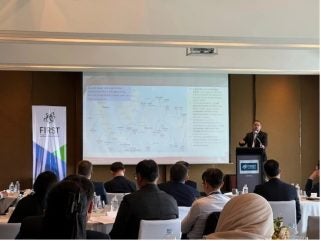
Indonesia’s National Research & Innovation Agency (BRIN – Badan Riset dan Inovasi Nasional) has said that the testing and operation of its first commercial nuclear power plant in Indonesia will take place in the 2030-2034 period.
Dr Topan Setiadipura, the head of BRIN’s Nuclear Technology Research Centre said in a statement that 80 small modular reactor (SMR) designs are currently being developed globally, one of which is a 40 MWt power and industrial steam generator, PeLUIt-40 (Pembangkit Listrik dan Uap Panas Industri-40), jointly developed by BRIN and several national institutions.
The groundwork for PeLUIt-40 was laid by the National Atomic Energy Agency (BATAN) before it merged into BRIN in 2021. It is an upgrade based on Indonesia’s 10 MW Experimental Power Reactor (Reaktor Daya Eksperimen, RDE) programme. PeLUIt-40 is currently in the design phase. It is a 40 MWt SMR that utilises high-temperature gas-cooled reactor (HTGR) technology with a pebble-bed design. BRIN has proposed a budget of IDR2.000bn ($125.7m) to the National Development Planning Agency (Bappenas – Badan Perencanaan Pembangunan Nasional) for a five-year development period.
Dr Setiadipura, addressing the South, Central, and East Asia Regional FIRST Conference on Advancing the Safe and Secure Deployment of Small Modular Reactors (SMR) in Seoul, South Korea earlier in June, invited international stakeholders to work together to develop the PeLUIt-40 reactor. The meeting was organised by the United States Foundational Infrastructure for Responsible Use of Small Modular Reactor Technology (FIRST) Program and the Republic of Korea.
“We invite international strategic partners to collaborate in the joint development of PeLUIt-40, for design approval and or to the construction of demo plants and further commercialisation,” he said. He explained that the Indonesian government has set nuclear energy as part of new and renewable energy in an effort to achieve the Net Zero Emission (NZE) target by 2060. The government is planning the commissioning and operation of the first commercial nuclear plant between 2030 – 2034.
Dr Setiadipura elaborated two possible strategies to deploy a SMR in Indonesia. The first is to collaborate with international vendors to use their SMR technology. The second is to develop national technology, such as the PeLUIt-40, through strategic cooperation with international parties.
In the first strategy scheme, he explained that, to develop and utilise SMR technology in Indonesia, vendors and energy companies must conduct intensive communication to develop specific targets and joint steps that combine the technology offered with Indonesia’s energy needs. “In this scheme, BRIN will act as a Technical Support Officer (TSO),” he said. “It is very important to form a consortium between SMR vendors and Indonesian energy or electricity companies in order to contribute positively to the realisation of nuclear power plants and build trust from the public and national stakeholders,” he added.
“Currently, there are several SMR vendors that have built communication with parties in Indonesia, starting to make initial agreements and some have even gone further to conduct techno-economic studies related to the implementation of certain SMR technologies,” he noted. “There are also international vendors who have indeed opened offices in Indonesia and carried out stages of SMR development and implementation.”
The meeting in South Korea was attended by representatives from Canada, Japan, UK as donor countries and participants from Indonesia, Philippines, Kazakhstan, Malaysia, Mongolia, Sri Lanka, Thailand, Uzbekistan, and Vietnam as well as from the International Atomic Energy Agency.
In late March, Dr Setiadipura also attended ATOMEXPO 2024 in the Russian city of Sochi, where he also promoted the PeLUIt-40. “The hope is that BRIN can carry out joint development. For the technology that BRIN is developing, suitable (partners) are Rosatom (Russia) or China.”
He said that BRIN targets approval from the Nuclear Energy Regulatory Agency (Bapeten – Badan Pengawas Tenaga Nuklir) of the reactor design by 2025, alongside site selection, before proceeding to construction approval. “We hope that in 2027 we can start construction, maybe let’s say it will take three years because the reactor is small. But that will also depend on our partners,” he noted.
Rosatom’s representative in Indonesia, Anna Belokoneva, affirmed their readiness to share nuclear technology development experiences to support Indonesia’s transition to clean energy. She emphasised nuclear energy’s crucial role in addressing climate change and achieving zero-carbon emissions.






